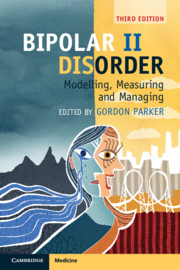Book contents
- Bipolar II Disorder
- Bipolar II Disorder
- Copyright page
- Dedication
- Contents
- Contributors
- Preface to the Third Edition
- Acknowledgements
- Section 1 Domain Chapters
- 1 Mapping the Terrain of Bipolar II Disorder
- 2 Bipolar Disorder in Historical Perspective
- 3 The Bipolar Spectrum
- 4 Defining and Measuring Bipolar II Disorder as a Categorical Condition
- 5 Bipolar II Disorder in Context: A Review of Its Epidemiology, Disability and Economic Burden
- 6 Comorbid Conditions Associated with Bipolar II Disorder
- 7 Personality and Temperament Styles Associated with Bipolar II Disorder
- 8 Differentiating Bipolar II Disorder from Personality-based Dysregulation Disorders
- 9 The Neurobiology of Bipolar II Disorder
- 10 Methodological Nuances in Undertaking and Interpreting Efficacy Studies of Medications for Bipolar II Disorder
- 11 The Role of Antidepressants in Managing Bipolar II Disorder
- 12 Mood Stabilisers in the Treatment of Bipolar II Disorder
- 13 The Use of Antipsychotic Drugs in Bipolar II Disorder
- 14 Perinatal Nuances in Managing Bipolar II Disorder
- 15 Psychological Interventions for Bipolar II Disorder
- 16 The Role of Well-Being Plans in Managing Bipolar II Disorder
- 17 The Trajectory of Illness Experienced by Those with a Bipolar II Disorder
- Section 2 Management Commentaries
- Section 3 Conclusion
- Index
- References
16 - The Role of Well-Being Plans in Managing Bipolar II Disorder
from Section 1 - Domain Chapters
Published online by Cambridge University Press: 17 December 2018
- Bipolar II Disorder
- Bipolar II Disorder
- Copyright page
- Dedication
- Contents
- Contributors
- Preface to the Third Edition
- Acknowledgements
- Section 1 Domain Chapters
- 1 Mapping the Terrain of Bipolar II Disorder
- 2 Bipolar Disorder in Historical Perspective
- 3 The Bipolar Spectrum
- 4 Defining and Measuring Bipolar II Disorder as a Categorical Condition
- 5 Bipolar II Disorder in Context: A Review of Its Epidemiology, Disability and Economic Burden
- 6 Comorbid Conditions Associated with Bipolar II Disorder
- 7 Personality and Temperament Styles Associated with Bipolar II Disorder
- 8 Differentiating Bipolar II Disorder from Personality-based Dysregulation Disorders
- 9 The Neurobiology of Bipolar II Disorder
- 10 Methodological Nuances in Undertaking and Interpreting Efficacy Studies of Medications for Bipolar II Disorder
- 11 The Role of Antidepressants in Managing Bipolar II Disorder
- 12 Mood Stabilisers in the Treatment of Bipolar II Disorder
- 13 The Use of Antipsychotic Drugs in Bipolar II Disorder
- 14 Perinatal Nuances in Managing Bipolar II Disorder
- 15 Psychological Interventions for Bipolar II Disorder
- 16 The Role of Well-Being Plans in Managing Bipolar II Disorder
- 17 The Trajectory of Illness Experienced by Those with a Bipolar II Disorder
- Section 2 Management Commentaries
- Section 3 Conclusion
- Index
- References
- Type
- Chapter
- Information
- Bipolar II DisorderModelling, Measuring and Managing, pp. 177 - 191Publisher: Cambridge University PressPrint publication year: 2019

